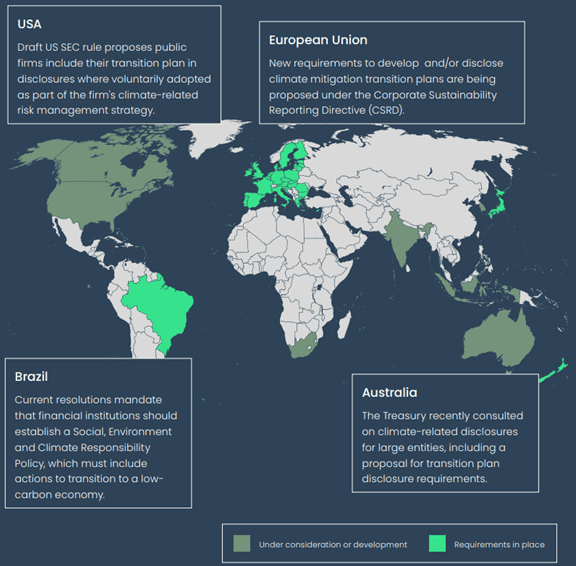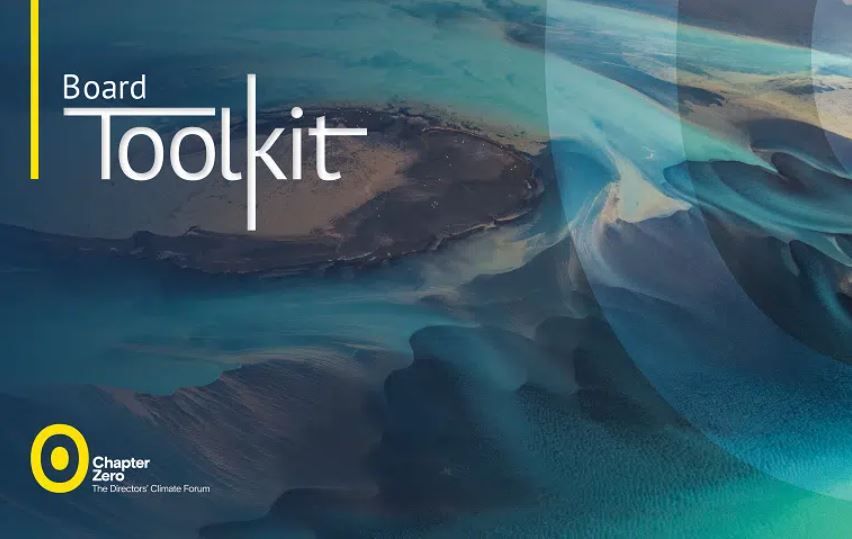The private sector is witnessing a shift towards establishing, not only the goals, but the actions that are vital for its transition to net zero. Transition Plans outline those actions. This toolkit, created by Chapter Zero provides guidance to board directors in taking the first steps to develop a credible transition plan.
Chapter Zero, the UK Chapter of the Climate Governance Initiative, and Chronos Sustainability have created a toolkit to help board directors navigate transition planning. It explains the basics of transition planning and supports board directors to assess the readiness of the board to develop a transition plan for the organisation. Although based on the UK’s recent launch of the Transition Plan Taskforce (TPT), the toolkit can be used by board directors globally.
The toolkit comprises four sections:
- Briefing – Explains the climate-reporting landscape and the key role of the board directors in transition planning.
- Scorecard – A questionnaire to gain insight into the board’s readiness for developing and disclosing transition plans.
- Governance Compass – A tool to support board committees to consider transition plans and align with the organisation’s Strategic Ambition.
- Barriers and Enablers – Explains actions directors can take to overcome barriers and leverage key enablers to effectively oversee their company’s transition.
Relevance of transition planning for board directors
Transition planning falls within the remit of the board as it involves assessing and shaping the business strategy to achieve climate targets. Board directors should play a crucial role in mobilising the development of transition plans, and during their oversight and disclosure. Regardless of the jurisdiction, establishing a transition plan can help organisations manage climate risks, foster innovation, meet stakeholder and investor expectations, and create long-term market value.
Transition plans in the UK
The TPT, a UK government initiative announced at COP26, developed a comprehensive framework of climate transition plans for corporates, integrating international standards such as the Taskforce on Climate-related Financial Disclosures (TCFD) and the International Sustainability Standards Board (ISSB). The TPT Disclosure Framework, published in October 2023, intends to create a gold standard for developing robust transition plans. Its recommendations aim to ensure consistent, high-quality and credible transition plans, which can hold organisations accountable to their climate commitments.
UK-listed companies and most UK-registered companies or LLPs with over 500 employees are currently required to make climate-related disclosures in line with the recommendations of the TCFD. The UK Financial Conduct Authority (FCA) expects listed companies to disclose transition plans following TCFD guidance and plans to strengthen these requirements. In early 2025, the FCA will consult on updating its rules to mandate reporting aligned with the ISSB standards, once endorsed for UK use. Concurrently, the FCA will consult on enhancing expectations for transition plan disclosures, referencing the TPT Disclosure Framework, reflecting international trends in reporting standards.
Ahead of these changes, the FCA encourages listed companies to voluntarily adopt ISSB standards and engage with the TPT Disclosure Framework. The UK Government also plans consultations to ensure the largest companies effectively align transition plan disclosures with its Green Finance Strategy. The IFRS Foundation’s integration of TPT materials into educational resources reinforces this alignment with global reporting practices.
Transition plans globally
The Glasgow Financial Alliance for Net Zero (GFANZ) and similar UN initiatives enabled and encouraged organisations to set climate targets. Momentum to map the pathways to achieve those targets is emerging across the world. Some governments are already considering or developing transition plans’ requirements for their jurisdictions, as seen in the figure below.

Figure 1. Extract from ‘Global uptake of transition plan requirements’.
Source: TPT Secretariat, 2023. Building momentum for transition plans, p.8
Moreover, multiple international organisations have provided guidance or critical views on transition planning, including the Grantham Institute at London School of Economics on just transition plans, the WWF on trustworthy plans from financial institutions, the Climate Policy Initiative on guidance to asses credible transition plans, and the United Nation’s Integrity Matters report.
The creation of the TPT is a significant step for corporates towards developing credible and achievable transition plans, a movement that is gaining traction across the world. It is critical to have the board’s involvement in establishing the actions and pathways to get to net zero, which may dictate or shift the business strategy. Many of your responsibilities as a board director are relevant to achieving your organisation’s climate targets - learning about transition planning may benefit your organisation’s climate journey.
Access Chapter Zero's Transition Planning Toolkit here: Transition Planning Toolkit - Chapter Zero




